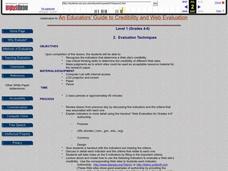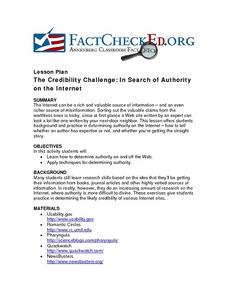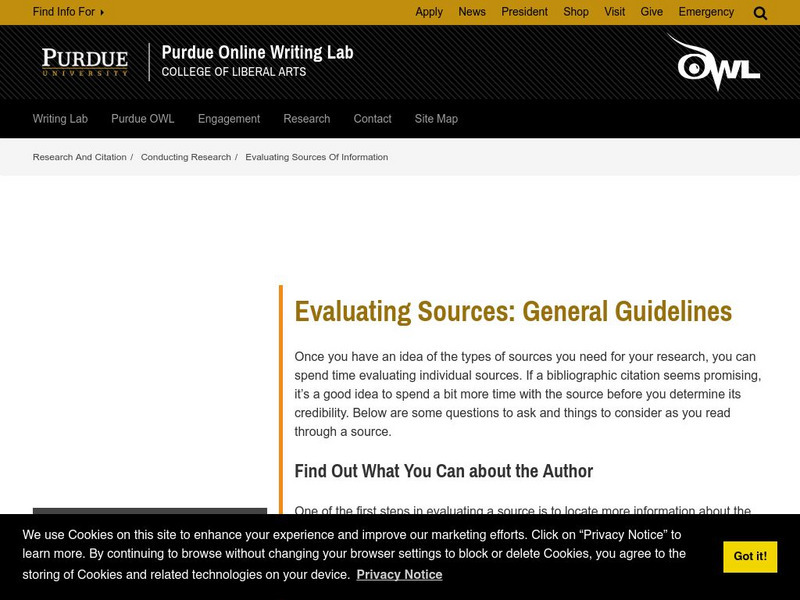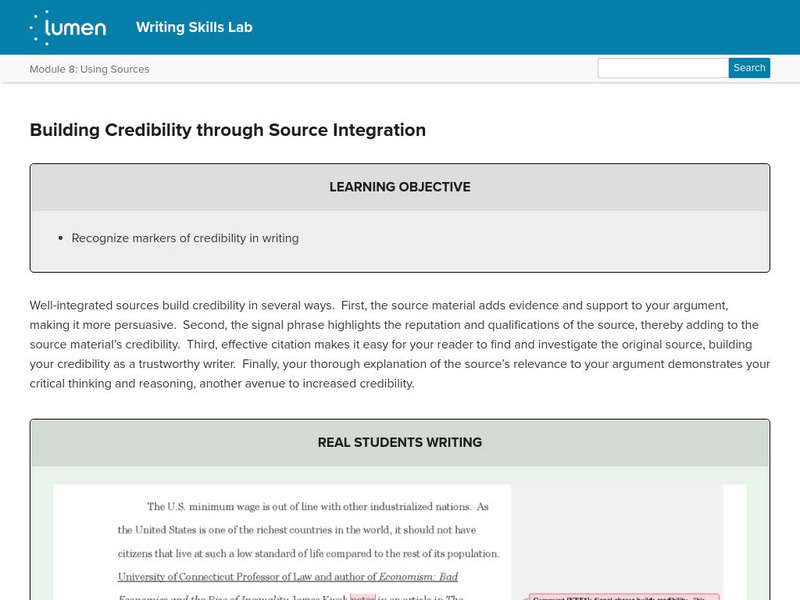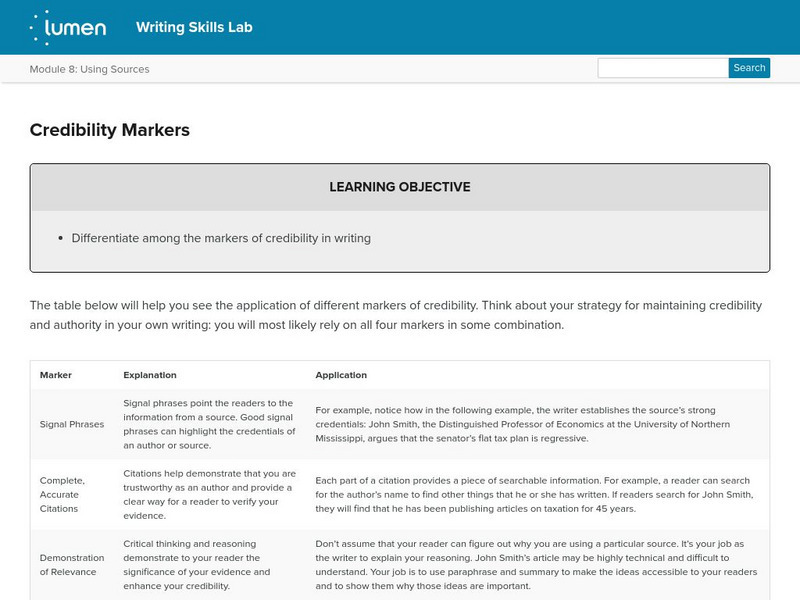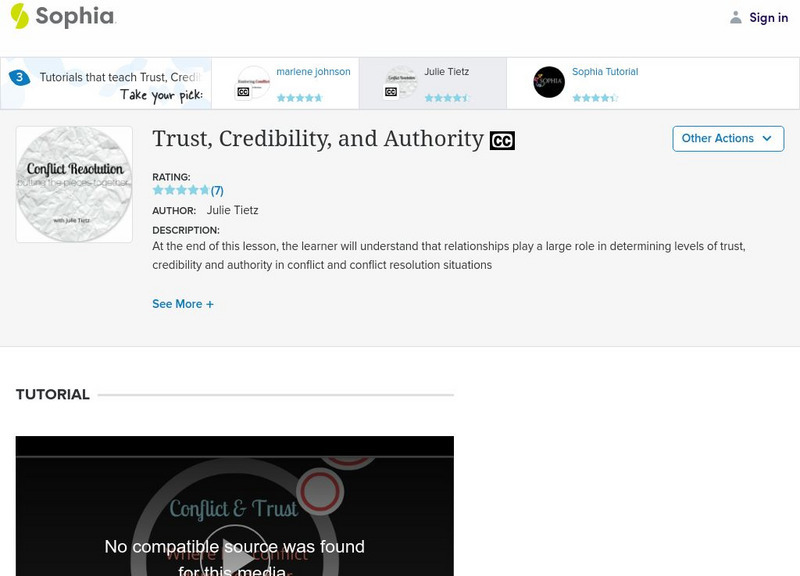Curated OER
Taming the Wild Wiki
Take a look at the credibility of online sources such as Wikipedia. Discussion points and handouts are included to facilitate a meaningful and informative dialogue. Tips are given on how to determine if a Wikipedia article is reliable...
Curated OER
Effective Persuasion: Developing Persuasive Documents
Great guidelines for writing persuasively are presented in these slides, along with plenty of questions to lead your scholars as they research. This PowerPoint will help your writers be clear, focused, and incredibly persuasive as they...
Curated OER
Evaluation Techniques
Students study the indicators that determine a Web site's credibility.
Curated OER
The Credibility Challenge: In Search of Authority on the Internet
Students identify and interpret the background and practice in determining authority on the Internet. Then they identify how to tell whether an author has expertise or not, and whether they're getting the straight story. Students also...
Curated OER
Hillary Clinton's Record, Through the Looking Glass
High schoolers assess how images and words in a political ad deliver its message and stir the emotions in the general public. They research information that supports or refutes claims made in the ad as well as the credibility of the ad....
Virtual Salt
Virtual Salt: Ideas for Enhancing Oral Reports
A helpful review of important parts of your report and ways to strengthen it. SL.9-10.4 Presentation
Stanford University
Sheg: Document Based History: Reading Like a Historian: Evaluating Sources
[Free Registration/Login Required] Are all historical sources equally trustworthy? How might the reliability of a historical document be affected by the circumstances under which it was created? For this activity, students sharpen their...
Stanford University
Sheg: Document Based History: Reading Like a Historian:sourcing Classroom Poster
[Free Registration/Login Required] Sourcing asks students to consider who wrote a document as well as the circumstances of its creation. Who authored a given document? When? For what purpose? This poster reminds students before reading a...
International Reading Association
Reading Online: Classroom Strategies for Exploring Authenticity in the Media
Four innovative classroom activities that actively engage students in analyzing and criticizing media messages. SL.11-12.2 Eval&Integrate sources
University of Sydney (Australia)
University of Sydney: The Write Site: Evaluating Your Evidence
This essay resource teaches students how to select the type of evidence that best lends weight and credibility to their topics and how to organize the evidence effectively. A chart is provided as a quick reference. Click on pages 2-4 at...
University of California
Uc Berkeley Library: Critical Evaluation of Resources
Questions to ask yourself when determining if a source is reliable. Discusses difference between primary and secondary source. List of reference sources and links to other sites that teach you how to evaluate sources....
Other
Seymour Community School District: 10 Rhetorical Devices [Pdf]
A slideshow discussing ten rhetorical devices, with links to examples, in-depth information, and a video. Covers logos, ethos, pathos, analogy, metaphor, irony, personification, rhetorical question, tricolon, and maxims. Presents a...
Online Writing Lab at Purdue University
Purdue University Owl: Evaluating Sources: General Guidelines
This entry focuses on evaluating your sources while reading them, giving suggestions on what to look for when reading.
TED Talks
Ted: Ted Ed: What Aristotle and Joshua Bell Can Teach Us About Persuasion
Imagine you are one of the world's greatest violin players, and you decide to conduct an experiment: play inside a subway station and see if anyone stops to appreciate when you are stripped of a concert hall and name recognition. Joshua...
Other
Teachers Network: Writing a Short Story Based on Kindred
In this lesson plan, students will engage in the technology, social studies, and language arts standards as students engage in reading by Octavia Butler's book entitled Kindred. Students will research tslavery. Students will keep a...
Other
Society of Professional Journalists: Code of Ethics
The complete text of the Code of Ethics by the Society of Professional Journalists.
Sophia Learning
Sophia: Supporting Details: Facts and Statistics
This lesson discusses how statistics can be used as supporting details. This tutorial shares a short audio lesson [05:16] and supplemental notes with the lesson's content.
Lumen Learning
Lumen: Using Sources: Building Credibility Through Source Integration
This lesson focuses on building credibility by properly integrating source materials. It discusses three ways of improving credibility through integration, provides an example, and a practice exercise. SL.9-10.2 eval & integrate...
Lumen Learning
Lumen: Using Sources: Credibility Markers
This lesson focuses on strategies for maintaining credibility and authority in your writing. It also provides a table of different types of credibility markers, an explanation, and the application for each. SL.9-10.2 eval & integrate...
Sophia Learning
Sophia: Trust, Credibility, and Authority: Who Counts for What?: Lesson 1
At the end of this lesson, the learner will understand that relationships play a large role in determining levels of trust, credibility and authority in conflict and conflict resolution situations. It is 1 of 3 in the series titled...
Other
Nctp: Ez Audits Accountability Made E Z
The National Center for Technology Planning (NCTP)offers five QUICK-START guidelines that will help you achieve success in your accountability efforts. These five steps are broken down to: Attitude, Organization, Maintenance, Growth and...




